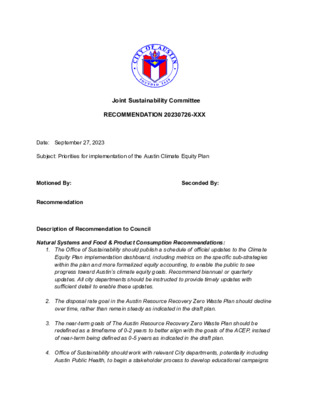10c. Draft recommendations from Consumption and Natural Systems Working Group — original pdf
Backup

Joint Sustainability Committee RECOMMENDATION 20230726-XXX Date: September 27, 2023 Subject: Priorities for implementation of the Austin Climate Equity Plan Motioned By: Seconded By: Recommendation Description of Recommendation to Council Natural Systems and Food & Product Consumption Recommendations: 1. The Office of Sustainability should publish a schedule of official updates to the Climate Equity Plan implementation dashboard, including metrics on the specific sub-strategies within the plan and more formalized equity accounting, to enable the public to see progress toward Austin’s climate equity goals. Recommend biannual or quarterly updates. All city departments should be instructed to provide timely updates with sufficient detail to enable these updates. 2. The disposal rate goal in the Austin Resource Recovery Zero Waste Plan should decline over time, rather than remain steady as indicated in the draft plan. 3. The near-term goals of The Austin Resource Recovery Zero Waste Plan should be redefined as a timeframe of 0-2 years to better align with the goals of the ACEP, instead of near-term being defined as 0-5 years as indicated in the draft plan. 4. Office of Sustainability should work with relevant City departments, potentially including Austin Public Health, to begin a stakeholder process to develop educational campaigns and incentives to promote healthy, low-carbon, protein-rich food choices within the retail space and non-retail programs (Mobile Markets, Healthy Food Pantries and pop-ups, etc.). This may include a local program similar to Double Up Food Bucks for protein-rich plant foods (such as beans, lentils and soy). Direct incentives to grocery stores and affordable restaurants (which could be in the form of coupons available to customers) should also be considered. The Office of Sustainability should pursue any available options for outside funding, including an EPA Climate Pollution Reduction Grant, in addition to city funding. Rationale: Natural Systems and Food & Product Consumption Recommendations 1. More data and information and more frequent updates to the dashboard is needed to better gauge Austin’s stated progress on climate goals. Data gaps, in particular on the Climate Equity Plan implementation dashboard, exist. Status of progress is only shown down to the “strategy” level, but each “strategy” in the plan actually includes multiple strategies. Reporting on the status of each sub-strategy is needed. Status of the actual implementation is sometimes out of date, and often doesn’t include any information about who is leading an initiative or who to contact to get more information or get involved. Additionally, equity accounting needs to be formalized. In order for Austin to meet climate goals, reducing waste in the first place is paramount. A disposal rate goal that declines over time is needed. While simply holding the disposal rate steady would be an improvement on the current trend in the short term (0-2 years), more ambitious goals are needed for the 2+ years timeframe. It is important to send a clear signal that the city is going to make a strong effort to reduce the amount of waste our community is producing. As more evidence mounts that there are significant environmental and health challenges around plastic recycling, reducing waste in the first place is paramount. [Food and Product Consumption Goal 3, Strategy 1] 2. 3. Austin’s waste-related emissions are significant and take the form of short term climate pollutants like methane and nitrous oxides that have a large short term impact when compared to carbon dioxide. The draft Austin Resource Recovery Zero Waste Plan lays out near term goals of 0-5 years and long-term goals of 5+ years, but no goals are clearly established for the 0-2 year timeline, which would better align with the goals of the Climate Equity Plan. Thinking primarily in 5-10-year terms simply is not sufficient to move the needle on emissions in a way that aligns with climate science or the urgency of the plastic pollution crisis. Faster action is both needed and achievable. [Food and Product Consumption Goal 3] Incentivizing healthy, climate-friendly food choices is needed to reduce emissions while improving health. Many of the most nutritious foods also result in less greenhouse gas emissions. By promoting healthy, lower carbon alternatives, like elevating the consumption of beans and other legumes to meet dietary protein needs, and offering 4. educational resources about the health advantages and reduced water usage associated with dairy alternatives, Austin can improve public health while contributing to reduced carbon emissions from the food sector. Providing and promoting healthy, climate-friendly food choices within the retail and non-retail programs can help make these foods more visible and accessible to all Austinites. [Food and Product Consumption Goal 1, Strategy 3] Vote For: Against: Abstain: Absent: Attest: [Staff or board member can sign]